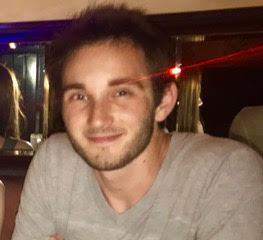 Zachary Lehman has been drawn to the alluring art of storytelling all his life. He is an avid reader and a passionate writer of stories. He enjoys hiking, dissecting strange foreign films, petting the occasional dog, the Oxford comma, and misspelling his name on social media. You can follow him on twitter @Zak_Lehman. Headlights
Do I look like a rapist or something? I stroke my mustache, which I trimmed earlier this morning. Maybe I should have just shaved it off--headlights! A Prius is approaching from up the road. I hold my sign up and try to steady my hands so the driver can read it clearly. The hybrid vehicle slows as it grows nearer to me. I smile, and the driver squints as she tries to read my sign. Eventually, she chuckles and smiles back at me before pulling away. Disheartened, I watch her drive a little farther up the road and pick up a different hitchhiker whose sign reads Denver, a city that’s one hundred and fifteen miles away. I scoff, I’m not asking nearly as much and yet she’s the seventeenth driver to pass me up today. Dammit, what am I doing wrong? I step outside of myself for a moment to assess my situation. I’m wearing an all-black suit, black undershirt, black dress pants, and classic oxford shoes - which are also black. People may be having trouble seeing me but I doubt it. I chose a bright red tie to help get spotted. A semi-truck barrels past, clearly going over the speed limit. The gush of wind that lags behind it hits me and brings me crashing back to reality… It has to be the mustache. The little hand on my watch rounds eleven for the third time since my wait out here began. I sigh as a minivan with a crack in the front window drives past me before stopping roughly a quarter of a mile past my section of the road. The minivans back door slides open and I watch an older woman and a child I assume to be the woman’s daughter climb in. Before the door slides shut the woman tosses her sign on the side of the road. The door then shuts, and the minivan sluggishly accelerates away. I walk over to the section of the road now littered by this woman’s sign. It reads Newcastle. 220 miles away, far too much to ask of someone. The sound of obnoxiously loud music gets me to turn back towards the road. A young man in a Mustang that was clearly handed down to him sits, parked, with his window down. He stares at me, the familiar tune of AC/DC’s “Highway to Hell” straining his vehicles speakers in the background. “Where you trying to go?” he asks, trying his best to achieve a decibel higher than that of the music. I hold up my sign. He reads it and breaks out into hysterics. Between laughs, he mutters, “Yeah… right!” and then revs his engine before speeding away. I suppose, given the context, it was kind of funny. A coyote howls, the sound emitting from a distance that would be far too close for comfort were I anyone else, but I didn’t care. I had been staring at the silhouette of the driver of this Mitsubishi Chariot since the little hand on my watch struck midnight ten minutes ago. He had driven past at first but had slammed on his brakes and reversed to me after I held up my sign. I’ve been trying to hold it steady for him but after eight minutes my arms began to get shaky. “Please.” I whisper to the driver, knowing he can’t hear me, “I’m so tired...” The car begins to move and my heart sinks as I expect him to pull away, yet to my pleasant surprise he does half of a three-point-turn which has now positioned him directly in front of me. His headlights now shining directly on me, rather than on the road. He revs his engine, and I extend my thumb. He begins driving straight for me, the light coming from the Chariot enveloping me as he speeds closer. Finally, I was beginning to think I had misspelled Heaven.
4 Comments
 BILL BUTLER was born and raised in NYC and didn't leave until age seventeen when he joined the army. He returned to Manhattan years later and worked as a private detective while earning a few degrees. He eventually settled in Scottsdale, Arizona. He has been writing for several years. Nine of his sort stories have been published. One of his favorites is featured in the 2017 Desert Sleuths Anthology, SoWest: Killer Nights. Three Days in Havana The raven-haired, hotel clerk picked up my passport, and flipped it open. She glanced at the photo then back at my face, then at the Cuban Visa. The Visa was a removable paper on the second page. Convenient for me, a US citizen who’d entered the country, via Belize, without first getting permission from the State Department.
She tapped a few keys on her computer. “Your room is ready, Mr. Crain,” she said in English. “I see that you signed up for the five day scuba package. They meet at the dock behind the hotel at eight every morning.” “Thank you. It’s late. I’m going to sleep right away. Can you give me a wakeup call at seven in the morning?” “Yes, sir.” I followed the bellman and my gym bag to my room on the first floor. Once inside, I handed him a US dollar. He seemed happy when he left, closing the door behind himself. I dumped out my gym bag on the bed. Among the jumble of clothes were two small bottles. Two drops in one ear and a spray in my throat. In moments, my tongue burned. They said that if I repeated this daily, the tissue would become inflamed. The next morning I walked out the hotel’s back door, across the wide sunlit lawn to the dock jutting into the sea. Seven people in shorts and T-shirts were already waiting. One with a black shirt on which ‘Dive Master’ was printed, smiled at my approach. “Woke up with a sore throat,” I croaked out. A middle-aged blond guy stepped forward and said in English, “I’m a physician. May I see?” I opened wide. One quick look, and he said, “You can’t dive today. Better see the hotel doctor.” The dive master nodded. “Sorry, Sir. Maybe tomorrow.” The doctor shook his head. “At least a week.” The hotel doctor ushered me into her office just off the lobby. She looked into my ears and throat and nose with an Otoscope. “Your throat and right ear are inflamed, possibly an allergy, or a virus.” She handed me a small box of pills. “Take one of these every four hours, and rest. Definitely, no diving. In three days if it isn’t any better, come back and see me.” I went directly to the hotel Concierge and dropped my Cuban airlines ticket on his desk. “I need to change this reservation. Can you get me on a flight to Belize tomorrow?” My voice cracked. He was able to get me on a seat on the next day’s afternoon flight. I had a smoothie for breakfast. The cold pureed fruit felt good on my raw throat. Then I went for a walk on the streets of Havana. It was fun strolling through this lovely old city, and the reconnoiter accomplished two tasks. I found locations with features, which would be useful later. Also, I got to watch the body language of Cubans in this city. Even from a distance, street vendors can identify a foreigner. The differences are subtle but real. By the time I got back to my hotel, the sun had slid behind buildings and the city’s lights were coming on. I emptied the two bottles of irritant into the sink, washed them out, and lay on the bed. It seemed like moments later that the morning sun flooded the room. My throat and ear were almost healed and I was hungry. I put on a dark blue, loose fitting long sleeve shirt and tan cotton trousers, and slipped on a battered pair of gray sneakers. Now, I was dressed like most men in Havana. In moments, I was seated in the hotel cafeteria. It was almost empty except for a few tourists, recognisable by their plumpness as compared to most Cubans, and of course cameras dangling from straps around their necks. A German couple and their two children were at the next table. When the waiter approached, I ordered what they were having. After a nice meal of coffee, scrambled eggs, two sausages and toast, I paid for the breakfast and went into the lobby and sat on a couch pretending to enjoy reading a paper I found there. My real goal was to detect if anyone had followed me. People came and went with no hangers on. While in Cuba, if you are an American, it’s reasonable to assume someone is always watching. I ambled down a wide hall, and looked at paintings and photos displayed on the wall between the doors to the conference rooms. Two men were doing that same thing. They could be my tail. The hall, which I reconnoitred the day before, took a ninety-degree turn and a few feet further were the restrooms, and an unmarked door which lead to the outside loading dock. A glance back, they hadn’t turned the corner yet, so I ducked out to the loading dock and walked down the street. To appear more like a local, my stride was shorter and I didn’t swivel my head, or swing my arms much. Another block and I entered a narrow alley, and looked back. They didn’t seem to have followed. Two blocks later, I stopped at a three-story apartment house, went in, walked down a dark hall and knocked on a wood door. Someone inside the apartment said in Spanish, “Who is there?” “Manuel Garcia sent me,” I replied in Spanish. A very old man, barely five feet tall, opened the door a crack. “My son sent you?” In English I said, “He is my neighbour in Miami and a friend. He asked me to look you up when I got to Havana.” His deeply wrinkled, ninety-seven year old face contorted into a lopsided smile. “Manuel is well?” he said in English. The door opened wider. “Please, come in.” We sat across from each other at a ragged wicker table on which sat two glasses of tepid water. I’d already refused coffee. I noticed the fragrance of a cigar. “Mr. Garcia, your son told me about your misfortune in 1958.” “I have not spoken about that in sixty-years.” Six months ago, over drinks in a Miami bar, his son told me that his father had been one of General Batista’s pilots. Everyone thought the pilot died when the plane disappeared over the Caribbean Sea. The plane sunk in three hundred feet of water. This man, wearing a cork and canvas life vest, barely made it to shore. Because the Communists put a price on his head, he hid in the jungle for ten years. Meanwhile, his wife and young son escaped to Miami. I laid a dozen photos and a three-page letter on the table. “These are pictures of your son’s family. You have four grand children.” The old man’s hands shook as he picked up the photos and held them close to his thick-lensed glasses. He wiped tears from his eyes and read the letter, then gently laid it down. “They called me a counter-revolutionary criminal. Now I am so old, they leave me alone.” I placed my cell phone on the table and touched an icon. The app would make electronic eavesdropping almost impossible. “Mr. Garcia, your son told me there was valuable cargo on the crashed plane.” “Did my wife have a good life? I know she passed away years ago.” “Yes. She loved the grandchildren and your son’s spouse and they loved her. She went to God in her sleep at eighty years old.” It’s uncomfortable to see an ancient man cry, but this was a special occasion. “The cargo?” I said. “Furniture and one hundred twenty-five kilos of gold bars,” he whispered. “I hoped my son could retrieve them someday.” “His letter and photos are only part of why he asked me to visit you. He said you might have the coordinates to the location of the plane.” He smiled. “Of course, I am a trained pilot and navigator.” He pointed to a framed photograph of Fidel Castro hanging on the wall. “Bring that to me.” When I handed it to him, he took the frame apart. On the back of the photograph were ten columns of hand written numbers. He laughed softly. “The fifth column is the coordinate. The gold has waited there for General Batista since 1958. But he is gone now. It is fitting that my son has it.” I went back to my hotel, and entered through the loading dock as I’d left. I’d been gone for less than an hour. While finishing coffee and apple pie in the cafeteria, I noticed the two guys who had followed me earlier. They probably thought I had never left the hotel. Time to go home. On the flight back to Belize, a sunburned American sitting next to me said, “Pleasure Trip?” “Yes. Scuba diving. In a few months, I’ll rent a boat and come back.” END 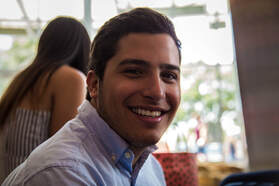 Jesus Carrillo-Alonzo is a Venezuelan student from Full Sail University. He is right now studying his second degree in Creative Writing, after already graduating from Computer Animation. He is proficient in the Office programs like Microsoft Word and PowerPoint, in animation programs such as Maya and Z-Brush and editing programs such as Adobe Photoshop and Adobe Illustrator. He is an avid writer and story board artist, who works towards the creation of several animated films. He has worked alongside fellow students in the creation of short films and animation projects, in the writing and pre-production area. His contact information is (484) 986-8990 and [email protected]. You can find him on on Twitter @Shuva9744 and on LinkedIn as Jesus Carrillo-Alonzo. It was a dark dayPaul was finishing his morning coffee when a big sound came from the door. Immediately, Paul got up and took the gun that he always had by himself and pointed it at the front of his house. He saw a quick shadow running through the window, but he couldn’t see exactly who he or she was. He started moving slowly and carefully to the door, with the gun up, he didn’t want to make a sudden move because he didn’t know if somebody was waiting for him outside. He opened the door little by little, and saw a little box a few inches in front of him, presumably there because of the strength it was thrown against the house. He quickly took the box and came right back to the inside of the house. With his heart pounding, Paul ran to the kitchen and opened the box, just to see that he had received one of the worst messages a policeman could receive. Inside the box there was a hand with a really nice watch on it, without the thumb and with a note under it. Paul immediately knew what this was all about, but he decided to read the note first: “I’m out,” Paul said .
Suddenly, all that surrounded Paul became blurry, and he started to relive the exact moments of three months ago, the crying, the chases, the Madman with the gun and the knife, his signature, the broken families, everything. Paul, was one of the heroic policeman that finally catched the Madman, a serial killer that terrorized the city for almost a year. The Madman killed almost 25 people in that year, and always with the same operandi, killing with the gun, cutting the hand and leaving it without a thumb, and taking the rest of the body and throwing it into the sea. It was a gruesome serial killer, and it was a battle for the police department to catch him over three months ago. Paul came back from the daze and look into the hand again, this time focusing on the watch that it had. He saw that the watch in the hand was the same exact same one that the Chief of Police had, so he assumed the worst, and with the head spinning, he didn’t notice that the phone was ringing. “Hello?” Paul answered. “Paul, is that you?” a woman responded. “Yes, Sharon, it’s me.” “Paul, I have terrible news, the Chief is dead,” Sharon said, sobbing. “Yes, I know. He sent me his hand in a damn box. Now, he’s after me.” “What?! Paul, get out of there! Come to the station as fast as you can. You’ll be safe here.” “I think I have to do this alone, is long time due this encounter, we need to see who kills who once and for all,” Paul said determined. “Don’t say crazy things, Paul! He is one of the most dangerous serial killers in history, you can’t do this alone!” Sharon said, sobbing even more. “Sorry, Sharon, I have to go now, don’t worry it would be fine.” “But….” “Bye.” Paul shut the phone as fast as he can because he heard how the key lock from the front door was being forced. He took the gun and pointed it to the door. When the lock cave in, man came in, with a knife in one hand and a gun in the other one. He looked taller and even more menacing that from three months ago. “Hi, Pauly, long time right?” the Madman said with a deep voice. “Hi, Tom.” “You know this the end right? Either you or me die today, but only one is coming out of here.” “Yes, I know,” Paul said with fear. “Well, bye my dear friend.” The Madman throw himself into Paul, that with the surprise of this sudden movement, couldn’t aim the gun well and the shot flew just a little centimeters away from Tom’s forehead. Paul ran and slide down the kitchen floor, still shooting to the nowhere, but shooting expecting to keep the Madman away from him. Tom laid down in the floor, and crawled to hide behind the couch in the living room next to the kitchen. He started shooting to the table, but with such poor sight from the living room, the shots didn’t come near the policeman. Paul knew that time, that to end finally with the Madman, he had to leave the good position that he had, and with a lot of courage, while the Madman was still shooting, he stood up and started shooting back to the couch. When he was a few steps away from the living room, dodging as fast as he could all of the bullets, the Madman stood up and fired, as well as Paul. The room became dark, but in a few seconds the colors and the light came back to Paul’s eyes. He noticed a great pain in his stomach, but with what little strength he had left, he saw the big body of the Madman in the floor, dead. With a sigh of relief, Paul closed his eyes, hoping that the sirens arrived quickly to save him. 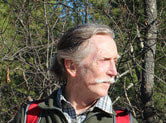 Brian wrote a few short stories while in college and immediately after graduation put the pen down. He promised himself that he would resume writing some day in the future never believing that day would ever come. The day arrived in 2006, thirty years after graduation, when he began writing short stories about art, refugees, and marriage among other topics. When not writing fiction, Brian spends his time hiking in New Hampshire's White Mountains, playing guitar, and volunteering as a grant writer at local non-profit organizations. Wretched Can People |
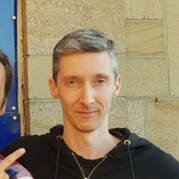
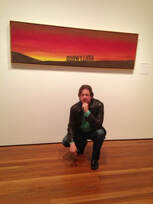
 RSS Feed
RSS Feed